
Iron Butterfly is an American rock band formed in San Diego, California, in 1966. They are best known for the 1968 hit "In-A-Gadda-Da-Vida", providing a dramatic sound that led the way towards the development of hard rock and heavy metal music. Although their heyday was the late 1960s, the band has been reincarnated with various members with varying levels of success with no new recordings since 1975. Their second album, In-A-Gadda-Da-Vida (1968), remains a best-seller, and Iron Butterfly was the first group to receive an In-House platinum album award from Atlantic Records. Their music has found a significant impact on the international rock scenes, influencing numerous acts such as Black Sabbath, AC/DC, Rush, Alice Cooper, Mountain, Uriah Heep, Soundgarden, Stone Temple Pilots, Slayer, King Gizzard & the Lizard Wizard, and Queens of the Stone Age.

Supertramp were a British rock band that formed in London in 1970. They experienced their greatest global success in 1979 with their sixth album Breakfast in America. Marked by the individual songwriting of founders Roger Hodgson and Rick Davies, the group were distinguished for blending progressive rock and pop styles as well as for a sound that relied heavily on Wurlitzer electric piano. The group's lineup changed numerous times throughout their career, with Davies being the only constant member throughout its history. The classic lineup, which lasted ten years from 1973 to 1983, comprised Davies, Hodgson, Dougie Thomson (bass), Bob Siebenberg (drums) and John Helliwell (saxophone).
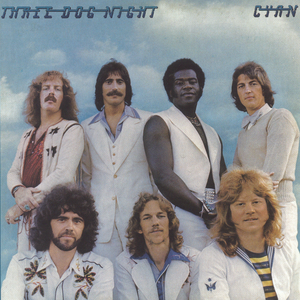
Cyan is the tenth studio album by American rock band Three Dog Night, released on October 9, 1973, by Dunhill Records. The album's original title was Seven Ball, Center Pocket, which was changed for unknown reasons.
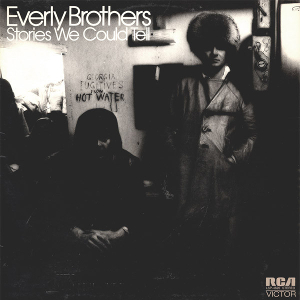
Stories We Could Tell is a country rock album by The Everly Brothers, released in 1972. It was reissued as Stories We Could Tell:The RCA Years by BMG in 2003 and included additional tracks, all stemming from the successor album Pass the Chicken & Listen. In 2014 it was re-released once more on Stories We Could Tell + Pass The Chicken & Listen by Morello Records.
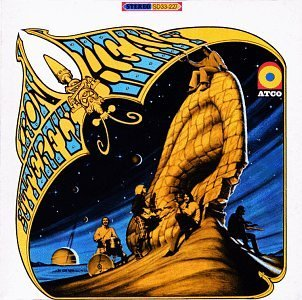
Heavy is the debut studio album by the rock band Iron Butterfly, released on January 22, 1968.

Sally Can't Dance is the fourth solo studio album by American rock musician Lou Reed, released in September 1974 by RCA Records. Steve Katz and Reed produced the album. It remains Reed's highest-charting album in the United States, having peaked at #10 during a 14-week stay on the Billboard 200 album chart in October 1974. It is also the first solo Lou Reed album not to feature any songs originally recorded by Reed's earlier band, the Velvet Underground, as well as the first of Reed's solo studio albums to be recorded in the United States. The album art was designed by noted Fillmore and Broadway poster artist David Edward Byrd and was one of the few album covers he ever designed.
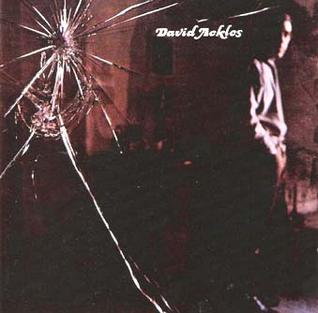
David Ackles is the self-titled debut album of American singer-songwriter David Ackles. Elektra Records later reissued it with new cover art under the title The Road to Cairo.

Evolution: The Best of Iron Butterfly is the fifth and first greatest hits album released in 1971 by American rock band Iron Butterfly. Songs come from four of their albums: Heavy, In-A-Gadda-Da-Vida, Ball and Metamorphosis.
Danny Weis is an American guitarist, best known as a founding member of both Iron Butterfly and Rhinoceros, as well as co-writer of Rhinoceros's only charting single, "Apricot Brandy". Though he left Iron Butterfly after only one album due to internal tensions, his work was an influence in the band for most of their history, since his replacement Erik Brann made a conscious effort to imitate his playing. Weis later recounted "Erik Braunn replaced me in Iron Butterfly, and if I remember correctly, he bought a lot of my equipment, some of my clothes, they tried to clone me basically..."
John Finley is a Canadian singer/songwriter who came to prominence with Toronto R&B band Jon and Lee & The Checkmates and later with the Elektra supergroup Rhinoceros.
Larry Leishman was a Canadian guitarist who was a member of Toronto R&B outfit, Jon and Lee & The Checkmates during the mid 1960s. When the band broke up in September 1967, he briefly worked with David Clayton-Thomas and various Toronto bands, including Bobby Kris & The Imperials and The Duke Edwards Cycle before joining Rhinoceros in August 1969.

Light & Heavy: The Best of Iron Butterfly is a greatest hits compilation released by Iron Butterfly in 1993. It contains most of their studio recordings from 1967 to 1970, including 21 of their 33 studio album tracks from that period.
Jon and Lee & the Checkmates are a Canadian music group, best known for containing future members of Elektra band Rhinoceros. Together with Mandala, they spearheaded Toronto's R&B scene during the mid-1960s. As the Jon-Lee Group, the band released a lone single for ABC Records before splitting up in September 1967. The group has more recently reformed, released its debut album in late 2006.
Essra Mohawk was an American singer-songwriter who recorded a dozen albums.

"Don't Look Down on Me" is the debut single by American rock band Iron Butterfly. Lead vocals were by Darryl DeLoach with Doug Ingle on organ and backing vocals. The song "Possession", which is on the flip-side, is the same as the version on the band's second single "Unconscious Power" as well as on the 1970 single release and is different from the version on the album Heavy. It is heavier in both its guitar and organ instrumentation than on the album version.

Stories We Could Tell: The RCA Years is a country rock compilation album by The Everly Brothers, released in 2003. The original LP Stories We Could Tell was produced by Paul Rothchild and released by RCA Victor in 1972. This CD contains the original album plus eight of the twelve tracks from the Everlys' other RCA album, Pass the Chicken & Listen.
Michael Fonfara was a Canadian keyboard player who was most notable for his work as a member of The Electric Flag and Rhinoceros in the 1960s, Rough Trade and Lou Reed's backing band in the 1970s and The Downchild Blues Band, from 1990 to the present. He studied classical piano at The Royal Conservatory of Music. He is a multiple Maple Blues Award winner as Piano/Keyboardist of the year and a Juno Award winner with the Downchild Blues Band. His distinguished musical career was so honoured by the Maple Blues Awards as early as 2000 and a Juno Award in 2014.

Better Times Are Coming is the third studio album released in 1970 by supergroup Rhinoceros on the Elektra Records label.
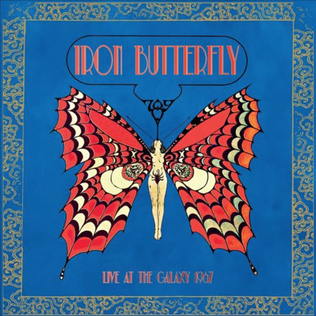
Live At The Galaxy 1967 is a 2014 unofficial live album by American psychedelic rock band Iron Butterfly, recorded on July 4, 1967 at the Galaxy Theater in Los Angeles, California and released as digital download, on digipak CD and deluxe colored 180 gram vinyl LP on the Purple Pyramids Records and Cleopatra Records label. It features the first, original line-up of the band, performing their early singles and songs from their debut album Heavy which was released a little more than six months later.

Rhinoceros is the 1968 debut album of Rhinoceros. The fold-out cover artwork by Gene Szafran shows a brightly colourful, beaded rhinoceros.













